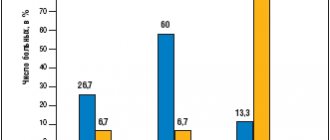In modern society, people are too busy with personal complexes and constant attempts to prove their success to pay attention to their internal state. And it often leaves much to be desired. Residents of megacities are like walking collections of neuroses; you won’t be able to point to anyone, but you will definitely encounter something special. But few people seek to visit a specialist in order to resolve their internal conflicts. Indeed, in our society it is very shameful to admit weakness and abnormality. Although normality is a very relative concept. In fact, contacting a psychiatrist is an adequate response to noticed mental disorders.
When do you need a psychiatrist?
The hero of one famous film said: “The head is a dark object and cannot be examined.”
Today's reality largely refutes his statement. In many countries of the world, scientists are discovering the mechanisms of development of certain mental disorders, creating new drugs, and, for better or worse, knowledge about the work of the psyche and the treatment of mental illnesses is growing. However, the causes of mental disorders remain largely unclear to this day. This means that no one can accurately predict the onset of mental illness.
Consequently, every time a mental disorder occurs unexpectedly. And you need to know its signs in order to consult a doctor in time and begin treatment.
These are the signs:
- decreased mood for several weeks or months;
- lack of desire to do anything, including things that previously brought pleasure or were a subject of passion;
- inappropriately elevated mood for several weeks or months;
- sleep disorders (difficulty falling asleep, shallow or interrupted sleep, nightmares, daytime sleepiness);
- isolation, isolation, combined with apathy or inappropriate or aggressive behavior;
- memory disorders;
- strange statements including ideas of persecution, greatness, influence, death;
- sudden loss of ability to work or learn;
- inappropriate emotional reactions (for example, laughter in a neutral or sad situation; or sadness and despondency in a situation of well-being);
- speech in the form of a monologue addressed to an interlocutor who does not exist in reality (“voices”);
- sad-angry mood, aggression, including for no apparent reason;
- apathy, melancholy, indifference;
- fear accompanied by inappropriate behavior in the period after the end of the binge;
- severe unreasonable anxiety, fear or panic;
- obsessive thoughts, ideas, feelings, actions that you cannot get rid of on your own;
- suicidal (related to suicide or causing any harm to oneself, mutilation) thoughts or statements or actions;
- emerging or emerging inability to use previously acquired knowledge or skills;
- mental agitation, inability to sit still, agitation, panic, aggression;
This list is far from complete, but it reflects the most common symptoms of the onset of mental disorders.
The appearance of any of these signs in a person requires calling a psychiatrist for diagnosis and subsequent therapy. Because without treatment, these conditions can quickly become life-threatening and health-threatening. And not only the patient himself, but also the people around him.
How antidepressants act on the body
Often, a psychiatrist prescribes antidepressants, mood stabilizers, antipsychotics, anti-anxiety medications, and sleeping pills. Modern drugs are quite safe and well tolerated, but still these are drugs that act not only on the psyche, but also on the entire body. Dosage, regimen, combination of drugs are issues that only the doctor can decide, based on the patient’s current condition. Self-diagnosis, self-medication or willful withdrawal can be extremely dangerous not only due to deterioration of the mental state, but also somatic complications.
shutterstock.com
The modern psychiatric paradigm prioritizes the quality of a person’s life, and not just the control of symptoms, so treatment is selected when the effect is achieved with minimal dosages, a minimal amount of drugs and exactly as much as necessary.
Natural remedies for stress. What to drink to feel less nervous
Types of psychiatric care. Where to contact
Emergency psychiatric care
When called, a team consisting of a doctor, paramedic, orderly and driver leaves; Instead of a paramedic, a second paramedic may be present. The reason for calling a psychiatric team is acute mental disorders, or chronic ones in case of exacerbation. A mental health emergency dispatcher may not accept a call if the mental disorder is not accompanied by a person being dangerous to himself or others.
Outpatient psychiatric service. Calling a psychiatrist to your home
The outpatient psychiatric service is represented by local psychiatrists from psychiatric dispensaries, as well as doctors from private psychiatric services. The difference between the former and the latter is that calling a doctor from a dispensary is free for a patient or his relatives, while a commercial doctor will need to pay for his visit. However, dispensary doctors rarely make house calls, preferring to delegate the right to provide home care to ambulance workers.
Psychiatrists from commercial psychiatric services make house calls in all cases where psychiatric examination, treatment or consultation is required.
Just dial +7(965) 152-76-09 and make a call.
How to choose a psychotherapist
You need to pay attention to professional training, experience and personal impressions. It should be understood that psychiatry, like any type of medical activity, is subject to licensing, so the doctor must have the appropriate documents. There are cases when people who have nothing to do with medicine and psychiatry introduce themselves as psychiatrists.
shutterstock.com
A professional works from the position of evidence-based medicine and relies not only on personal experience and opinion, but also on clinical recommendations. Another very important factor is the doctor’s contact with colleagues: psychologist, neurologist, endocrinologist, therapist, gynecologist. It often happens that a patient requires the help of several specialists, and it is good when their actions are coordinated. This applies not only to the field of psychosomatic disorders. An integrated approach allows you to choose the right treatment individually for each patient.
Is it possible to consult a psychiatrist online? Consultation with a psychiatrist via Skype
Remote counseling is certainly possible. The prior informed consent of the person believed to be suffering from a mental disorder will be required for such consultation.
Our Skype login: psychosphera.ru
During the consultation process, the doctor can diagnose the condition, prescribe or adjust treatment, and even send a certified copy of the prescription in the form of a graphic file.
For any questions, please call us in advance:
+7(965) 152-76-09
All materials on the site are presented for informational purposes only, approved by certified physician Mikhail Vasiliev, diploma series 064834, in accordance with license No. LO-77-005297 dated September 17, 2012, by a certified specialist in the field of psychiatry, certificate number 0177241425770.
How does a psychiatrist define mental illness?
Unfortunately, the main tool of a specialist remains a clinical conversation with the patient. In the process of dialogue, disturbances of consciousness, memory, emotions, thinking, and attention are revealed. World science has not yet come to the point of inventing a test for depression or scanning for schizophrenia. However, to establish a diagnosis, magnetic resonance imaging data, clinical blood tests, assessment of hormonal and even genetic status are additionally used. Although a depressed mood cannot be seen on an MRI, these studies make it possible to exclude physical symptoms of some mental disorders. Quite often, anxiety disorders are based on dysfunction of the thyroid gland or pituitary gland, and depression turns out to be a manifestation of a neurodegenerative disease. A striking example is post-Covid syndrome, when a person has recovered from pneumonia, and according to the results of a CT scan, everything is also fine, while the person feels fatigue, lethargy, anxiety, absent-mindedness and other symptoms - the consequences of an acute infection.
shutterstock.com
At an appointment with a psychiatrist
You can see a psychiatrist privately or at the precinct. A referral to a local doctor is issued by any specialist who suspects a patient has a mental disorder. You can also make an appointment for an outpatient psychiatric appointment yourself. The local doctor sees you at a psychoneurological or narcological clinic at your place of residence, in a psychiatric office of a clinic or hospital.
Consultation with a local psychiatrist is free.
A private psychiatrist sees patients in private specialized clinics, of which there are a sufficient number. Here you can find specialists and narrow profiles described above. Private clinics also provide psychiatrist services for psychiatric examinations provided to various authorities.
A consultation with a psychiatrist begins with a conversation. The doctor asks the patient about complaints, lifestyle, communication with friends, relatives and colleagues, assesses the general condition, and, if necessary, communicates with relatives.
For examination, the psychiatric office has a couch, a tonometer, and a phonendoscope. An additional device is a breathalyzer to determine blood alcohol. Using a neurological hammer, the doctor determines the severity of reflexes. A set of aromatic products allows you to assess the level of smell. In addition, the doctor uses special psychological techniques to assess the patient’s mental activity.
After a conversation and examination, the doctor makes a conclusion about the patient’s condition, makes a diagnosis and determines treatment tactics. Prescribes appropriate therapy.
If necessary, for further examination, the psychiatrist gives a referral to the patient for testing. Their list may include:
- EEG;
- rheoencephalography;
- ECG;
- MRI, CT;
- blood and urine tests;
- Ultrasound;
- specific psychiatric studies;
- consultations with other specialists - neurologist, endocrinologist, cardiologist, urologist, therapist, etc.
After consultation, the psychiatrist prescribes outpatient or inpatient treatment to the patient.
When seeking psychiatric help in a private clinic, a person has the opportunity to receive not only a doctor’s consultation, but also undergo an examination. Moreover, today private psychiatric institutions have a wide arsenal of methods with a specific focus. Naturally, here you will receive individual treatment. Some clinics even have an inpatient department.
A psychiatrist also conducts clinical examinations of people suffering from chronic mental illnesses.
News and discussions
17 December 2021, 12:21
Support program for 2022 of the “Future-Today” Charitable Foundation
Invitation to take part in a charity program
15 December 2021, 09:23
Is it the psychiatrist's fault again?
In Nizhny Novgorod, the trial of psychiatrist Vitaly Baluev began, who in July 2021 recognized student Danil Monakhov as mentally healthy,…
13 December 2021, 08:25
Discussion of the CD projects “GAD” and “Panic Disorder” in Children
Received from the chief freelance child psychiatrist Prof. E.V. Makushkina
9 December 2021, 17:50
Anniversary of Professor Petr Viktorovich Morozov
Congratulations from the President and Executive Committee of the ROP
9 December 2021, 08:43
Decade of Disabled People
Film from St. Petersburg State Budgetary Healthcare Institution PND No. 5
9 December 2021, 08:26
The LEF1 gene is a possible target for the development of drugs for the treatment of bipolar disorder.
Information for specialists
>
138213811380137913781377
Materials for specialists
March 30, 2021, 11:59 pm
Somatoform disorders
Electronic module of Continuing medical education. Author - Ph.D. A.A. Pribytkov
24 March 2021, 17:53
Efficacy of antipsychotics in schizophrenia
Electronic module of Continuing medical education. Author - Ph.D. V.E.Medvedev
26 February 2021, 09:49
Stress-induced depression
Recording of an educational seminar as part of the Colloquium series of seminars (October 14, 2021 - Moscow), organized by the Russian Society of Psychiatrists with the support of Pfizer
393831
all materials
Materials for non-specialists
17 April 2021, 08:40
A guide for children with epilepsy and their parents
A manual for children with epilepsy and their parents: a methodological manual for children, educators and parents / V.I. Guzeva, V.A. Karlov, O.V. Guzeva, V.V. Guzeva, I.V. Ohrim. - St. Petersburg, 2021. - 36 p.
April 12, 2021, 11:09
Masha Pushkina. Bipolars. How do people with...
What is it like to be a “bipolar bear”, to ride a daily roller coaster of your own mood, not knowing what kind of superhero you will wake up tomorrow - a superhero or a miserable wreck? In this book…
12 April 2021, 10:51
What diseases does a psychiatrist work with?
The first step towards curing diseases of the soul is for a psychiatrist to study the mechanisms of occurrence of a particular disorder in the psyche of a particular person, diagnose the disease and prescribe appropriate treatment.
Psychiatrists can consult both sick and healthy patients; their competence also includes the process of examining mental health when determining legal capacity or the level of mental instability.
All psychiatry is divided into several areas, in each of which there are doctors who most often deal with the specific mental specifics of human health: organizational, developmental, forensic psychiatry, narcology, psychopharmacology, social psychiatry.
It is impossible to name all the diseases that a psychiatrist can cure, since their list is very long, and it is constantly expanding with emerging new forms of psychiatric abnormalities. In addition to the above reasons for contacting psychiatrists, we can name several more classic psychiatric diseases that are within the competence of this medical specialist:
- epilepsy;
- Alzheimer's disease;
- delirium tremens;
- phobias of various types, severe depression;
- unreasonable long-term psychosis, frequent hysterical seizures, schizophrenic states;
- mental disorders arising in post-traumatic syndrome;
- various forms of insurmountable addictions (alcoholism, for example);
- bulimia and anorexia.
Only a good psychiatrist can finalize the diagnosis of people suffering from the above and many other diseases; all subsequent treatment with medications and therapeutic agents must be coordinated with him.
Areas of psychiatry
In modern psychiatry there are several main directions:
- Organizational psychiatry. Resolves issues of organizing care for the mentally ill, studies epidemiology, and develops ways to reduce the incidence of neuropsychiatric disorders.
- Forensic psychiatry. The section is in charge of mental disorders related to problems of criminal law.
- Psychopharmacology. The direction is devoted to the study of the therapeutic effects of medicinal substances on human behavior and mental activity.
- Social psychiatry. Determines methods of rehabilitation and adaptation of mentally ill people in society.
- Developmental psychiatry. Studies abnormalities in children, adolescents and the elderly (gerontopsychiatry).
- Narcology. Provides assistance to people suffering from various pathological addictions.







